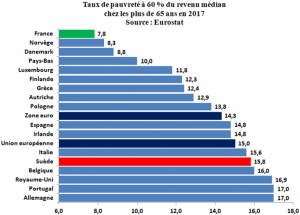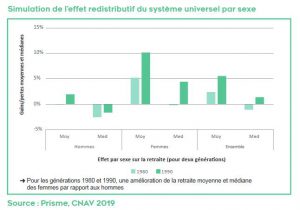Pensions: a complicated subject. While inaccurate or incomplete information is circulating, we'd like to take a look at some of it.
Many colleagues will be on strike on 5 December. And they will have many reasons to do so. At Sgen-CFDT, we are more interested in shared. For us, however, one thing is certain: we must mobilising for a better pensions system. But with the right information and the right objectives. So let's take a look at some of the things that are going around.
1) IS OUR CURRENT PENSION SYSTEM FAIR?
Where our pension system performs well is in the fight against poverty. The poverty rate for the over-65s in France is the lowest in Western Europe.
However, this does not mean that our system is socially fair. The current method of calculation heavily penalises women, multiple pensioners and, in general, those who do not benefit from significant increases over the course of their career. Here's why.
- For the multiple pensionersThe method of calculation involves taking the best years (or months) in each scheme rather than just the best years. If we add to this, in National Education, the very low level of consideration given to previous service when reclassifying, we end up with a very heavy loss. Multiple pensioners account for 30% of National Education staff, and this proportion is rising all the time.
 - On the womenInequalities are more insidious. But they lead to catastrophic results: 37% difference between the average pension for women and men. A gap that is far greater than pay inequalities during working life. Why should this be? Because by focusing on the best years of a career, the current system actually emphasises the parts of a career where there are the greatest gaps between men (who benefit from more promotions) and women. When you retire, the glass ceiling plays a double role.
- On the womenInequalities are more insidious. But they lead to catastrophic results: 37% difference between the average pension for women and men. A gap that is far greater than pay inequalities during working life. Why should this be? Because by focusing on the best years of a career, the current system actually emphasises the parts of a career where there are the greatest gaps between men (who benefit from more promotions) and women. When you retire, the glass ceiling plays a double role.
- For the same reasons, the system favours those who have careers with high increases over those with flat careers. However, these careers are more likely to involve workers on insecure contracts or earning close to the minimum wage. This is the case in Education Nationale for category C staff, whose careers progress much less than those of category A staff. So the current system does more than reproduce pay inequalities throughout a career. It ratifies them at the point in the career when they are most important.
As for the special schemes, they recognise the specific features of certain professions. But they leave out many others. While the arduous nature of the work of Paris metro drivers is partly recognised under this scheme, the work of their colleagues in Lyon and Marseille is not at all. Nor is it, at SNCF in the end, inequalities in life expectancy are just as great, if not greater, between the various categories of company employees than between railway workers and other professions
2) WILL THE REFORM REINFORCE GENDER INEQUALITIES?
This is the thesis defended in particular by this comic strip which has been circulating a lot on social networks. To put it simply: the points system, by counting all parts of a career, would be detrimental to women, whose careers are often more chaotic.
 By analysing the Delevoye report -the only official source at this stage on what this reform would look like, even though the bill has not yet been published- things look different. On the contrary, the report boasts that the new system would reduce inequalities between men and women, as can be seen from the table opposite.
By analysing the Delevoye report -the only official source at this stage on what this reform would look like, even though the bill has not yet been published- things look different. On the contrary, the report boasts that the new system would reduce inequalities between men and women, as can be seen from the table opposite.
So, of course, we can say that the report is not necessarily very honest. But in that case, why take it as gospel when it announces the apocalypse and consider it to be nonsense when it announces improvements?
If we dig a little deeper, we realise that the comic strip presented omits a large number of elements likely to reduce inequalities between men and women:
- a bonus granted from 1er child (compared with 3 today)
- the possibility for women to benefit from all the couple's family rights when their career has been more affected by choices linked to children
- pension rights for periods of reduced activity or career breaks linked to children (contrary to what the comic strip claims)
In any case, we'll have to wait for the bill to really assess the impact of the reform on gender inequality, so that we can take a stand.
But this example has the merit of illustrating an essential point: the question is not so much "points or no points" but rather which system to use overall. In both systems it is possible to create unfair situations. Or to repair them by emphasising solidarity.
3) WILL THE REFORM LEAD TO A 30% REDUCTION IN TEACHERS' PENSIONS?
Numerous simulations point to a significant drop in teachers' pensions if the Delevoye report is applied as it stands. Taking into account teachers' entire careers would not be compensated for by taking into account bonuses, which are low in the French education system.
However, you need to be careful with the simulations. To compare the 2 systems, they consider the situation of someone who starts their career in the new system in 2025. Retirement would then take place in... 2067. In other words, a lot can happen between now and then. What's more, these simulations often compare future careers with current full careers in the French education system. As we saw earlier, these are becoming increasingly rare.
That said, it is clear that applying the Delevoye report as it stands would lead to a significant reduction in the pensions of National Education staff. For Sgen-CFDT, this is not acceptable. Discussions to obtain compensation are already underway, at the initiative of the government. The Minister has pledged that the pensions of National Education staff will be equivalent to those of other civil service bodies in the same category. To put it plainly: around €2,500-2,600 for a certified teacher or schoolteacher who has completed a full career.  For us, these discussions are essential: they must enable us to earn more, not in 2067, but tomorrow. Our position can be summed up as follows: earn more today to earn as much tomorrow, when you retire. Finally, we believe it is essential that this upgrade is not, as is sometimes suggested, made conditional on additional tasks for teachers.
For us, these discussions are essential: they must enable us to earn more, not in 2067, but tomorrow. Our position can be summed up as follows: earn more today to earn as much tomorrow, when you retire. Finally, we believe it is essential that this upgrade is not, as is sometimes suggested, made conditional on additional tasks for teachers.
Will we win our case? How much will it cost? How much? How much? It's impossible to know at this stage, as discussions have barely begun. We'll know more in January-February.
In the meantime, here is a (non-exhaustive) list of all the unknowns that the anxiety-inducing simulators cannot deal with:
- the amount of the point and its evolution ;
- the conditions of transition between the old and new regimes ;
- the compensation that will (or will not) accompany the reform ;
- the many political changes until 2067;
- global warming, melting ice and so on (underwater retirement?).
An essential point of the reform is the question of governance of the future system. Who will be in charge of the regular choices to be made under this new system? In our view, it is essential that the organisations representing employees are heavily involved in this governance.
4) WOULD LIMITING THE SHARE OF PENSIONS IN GDP NECESSARILY LEAD TO A REDUCTION IN PENSIONS?
The Delevoye report provides for the introduction of a "golden rule", which the CFDT is not in favour of, that would limit spending on the pension system to a certain proportion of GDP (probably around 14%). For some, this would guarantee a fall in pensions as a result of the increase in the retired population. A constant share for a larger population effectively implies a fall.
The reality is more complex and nuanced. Over the last twenty years or so, we have seen a rise in the proportion of the population aged over 65, the dual result of increased life expectancy and the retirement of the baby-boom generations, Projections for the period after 2035 are more moderate. Moreover, despite this increase, the share of pension expenditure in GDP has stopped rising in recent years after rising steadily from 2000 to 2013. It has to be said that GDP is also rising steadily.
More generally, this line of reasoning overlooks the fact that pensions in France, under both the current system and the one proposed by the Delevoye report, are a pay-as-you-go system. This means that pension money does not fall from the sky: it is the contributions of working people that pay for the pensions of retired people, who have contributed before. This is the very essence of intergenerational solidarity, a principle and an assurance that the French are rightly very attached to.
But this also means that increasing the overall amount of pensions means either an increase in employee contributions, or an increase in the length of the contribution period. We don't think either of these solutions is desirable. Clearly, there is an overall balance to be respected between employees and pensioners. And that the issue is not so much the size of the pension cake. It's more a question of the distribution of all the wealth produced between working people and pensioners. And of the contribution of each individual to this solidarity according to their level of income. A more global way of thinking about the subject. And to remember that talking about pensions is also, and above all, talking about work.
We hope that you have gleaned some information from reading this. If you spot any errors (despite all our precautions), or if you have any further questions, please do not hesitate to write to us at creteil@sgen.cfdt.fr.
What we are campaigning for is social justice reform. We don't despair of getting it. We look forward to seeing you in early 2020 to study the bill in depth and do everything we can to improve it. On pensions, perhaps even more than elsewhere, the devil is in the detail.
PUBLICISE THIS PUBLICATION ON THE NETWORKS!

